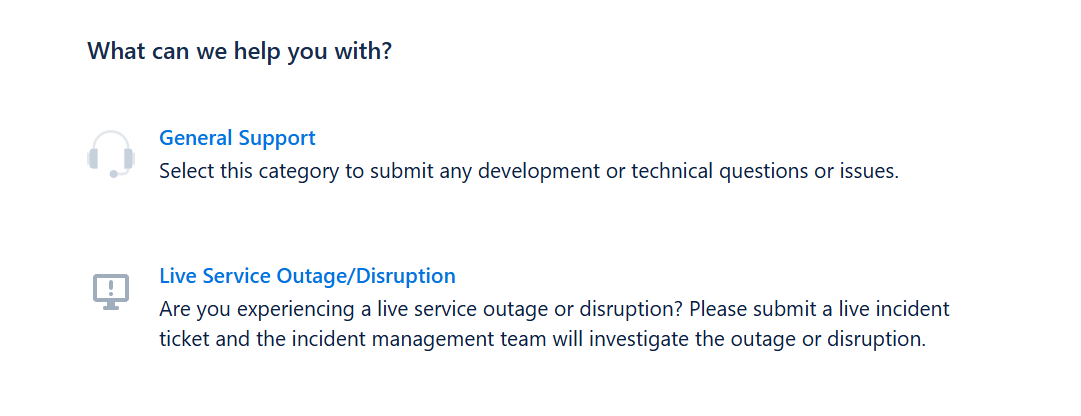Support Response Procedure
This page describes the process on how incidents and support tickets are managed.
Definitions
Support cases are categorized based on the urgency and severity of the issues presented
Severity Levels and Descriptions
Severity 1
- Assigned to outages that prevent or significantly delay access to the environment provided to Customer by AccelByte.
- Examples:
- Players or developers unable to complete core game use cases (e.g. login failure, matchmaking down, purchase system failure)
- Security issues or data loss
- Preventing complete access to the game
Severity 2
- Assigned to a situation that moderately slows response time or limits functions of one of the application components.
- Examples:
- Issues in non-core game features (e.g. unable to load player profile, unable to fetch achievements, unable to access admin portal)
- Slowness or degraded performance
Severity 3
- Assigned to non-urgent issues, general questions or requests for enhancement.
- Examples:
- Question about product feature, functionality or how to solve specific use cases
- Non critical bug reports
- Request for a new API or feature
Remarks
- All reported issues shall be subject to an initial triage process conducted by AccelByte to determine the applicable severity level.
- Issues can currently be reported via the AccelByte Customer Support Portal under two categories: Live Service Outage/Disruption and General Support.

- By default,
- Issues reported as live service outage or disruption will be assessed to be classified as Severity 1 or Severity 2, depending on the impact
- Issues reported as General Support will be classified as Severity 3.
- Following the AccelByte’s triage process, reported issues may be subject to de-escalation or escalation in accordance with the determined severity level.
Response Times and Resolution Targets
| Severity | Initial Response* | Target Communication Update** | Target Time to Resolution*** |
|---|---|---|---|
| Severity 1 | 15 Minutes | 30 Minutes | 8 Hours |
| Severity 2 | 15 Minutes | 2 Hours | 24 Hours |
| Severity 3**** (Standard) | 8 Hours | 24 Hours | 72 Hours or Diligent Effort |
| Severity 3**** (Professional) | 2 Hours | 24 Hours | 72 Hours or Diligent Effort |
| Severity 3**** (Enterprise) | 30 Minutes | 24 Hours | 72 Hours or Diligent Effort |
Remarks
- * "Initial Response" Acknowledgement of issue reported, confirmed receipt and commencement of investigations.
- ** "The Target Communication Update" AccelByte shall make reasonable efforts to provide timely and meaningful updates within the targeted intervals to keep customers informed of progress throughout the resolution process.
- *** "The Target Resolution" AccelByte shall make all reasonable efforts to resolve issues within the stated timeframes. However, the actual resolution time may vary depending on the complexity of the issue, specific use cases, and situational factors. AccelByte is committed to applying diligent and reasonable effort to respond to and resolve all reported issues.
- **** "Severity 3 issues" shall be triaged further into the following categories
- General support (72 Hours) – Inquiries related to product features, functionality, or implementation of specific use cases. This includes questions about product usage, code troubleshooting, integration, and configuration issues.
- Others (Diligent Effort) – Other inquiries that may require product changes or deeper investigation, such as bug reports, feature requests, solution design consultations, or requests for professional services.
- "General Support Coverage" General support operates Monday through Friday, excluding weekends. Requests submitted outside these hours will be addressed on the next business day. For critical issues occurring during off-hours, we recommend raising an Incident ticket (live service outage) to ensure 24/7 handling by our Incident management team.
- “Enterprise Customers” are entitled to 24/7 support coverage. All support requests, across all severity levels, will be handled around the clock in accordance with the customer’s support plan.
- "Support Tiers for Severity 3" Initial response times vary depending on the customer’s support tier, while communication updates (24 hours) and target resolution efforts (72 hours or diligent effort) remain consistent across all tiers
- Standard Tier – Baseline support with an 8-hour initial response time.
- Professional Tier – Enhanced support with a 2-hour initial response time.
- Enterprise Tier – Premium support with a 30-minute initial response time to ensure the fastest possible engagement.
Exclusions
The response-time and resolution targets set out above do not apply to any Incident, Request, or period of unavailability that is caused or contributed to by any of the following:
Scheduled or Announced Maintenance – maintenance (including platform upgrades and security patching) that is (i) performed within AccelByte’s standard maintenance windows, or (ii) announced to Customer at least 72 hours in advance.
Emergency Maintenance – unscheduled work that AccelByte deems necessary to protect the security, stability, or performance of the Services, provided that notice is given to Customer as soon as practicable.
Force Majeure Events – events outside AccelByte’s reasonable control, including acts of God, natural disasters, war, terrorism, riots, civil unrest, labour disputes, governmental action, or failures of the public Internet or of third-party networks, power, or telecommunication services.
Cloud-Infrastructure or Third-Party Provider Failures – outages or service degradations originating with AccelByte’s underlying hosting providers (e.g., AWS) or with third-party services, integrations, or payment processors used by Customer.
Customer-Controlled Factors – (i) faults in Customer’s software, code, configurations, or equipment; (ii) networking or connectivity issues on Customer’s side; (iii) misuse of the Services or operation outside the scope of the Documentation or reasonable written instructions from AccelByte.
Unsupported, Beta, or Trial Features – functionality identified as alpha, beta, preview, proof-of-concept, professional-services deliverables, or otherwise not yet generally available, as well as any non-production, staging, or test environments.
Security Threats and DDoS Attacks – platform slow-downs or unavailability while AccelByte is actively mitigating denial-of-service attacks or other malicious activity directed at the Services.
If an Incident or Request falls partly within an exclusion, the SLA timing will be paused for the duration of the excluded condition only.